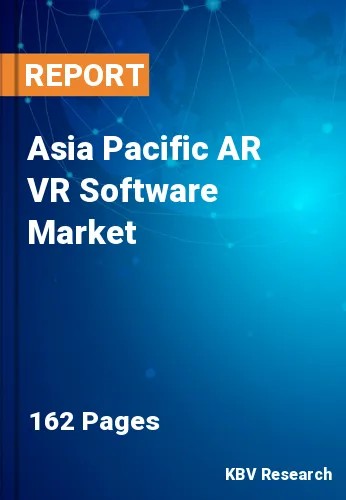The Asia Pacific AR VR Software Market would witness market growth of 18.5% CAGR during the forecast period (2023-2030).
The advent of standalone VR headsets has made VR more accessible to a broader audience. These devices do not require tethering to a computer, making them user-friendly and versatile. The introduction of augmented reality glasses, such as the Microsoft HoloLens and the Google Glass Enterprise Edition, demonstrates the industry's progress in creating lightweight, consumer-friendly AR devices.
Furthermore, the push for 5G connectivity is expected to revolutionize the AR and VR landscape. The ultra-low latency and high bandwidth of 5G networks will enable real-time data transmission, significantly enhancing the performance and capabilities of AR and VR applications. This technology will unlock new possibilities for remote collaboration, augmented reality in smart cities, and more immersive entertainment experiences.
One of the most significant factors propelling the growth of the market is the continuous refinement of hardware. The market has witnessed the emergence of more sophisticated and accessible AR and VR devices, from high-end headsets to affordable smartphone-based solutions. Companies like Oculus, HTC, and Microsoft have introduced a new generation of headsets that offer higher resolutions, wider fields of view, and improved tracking capabilities.
A burgeoning video game industry is located in Australia. According to the government, in 2021, this industry generated $226.5 million in sales, a 22% increase over 2020, and 83% of the money came from foreign markets. The implementation of large federal as well as state-based tax incentives will cause these numbers to increase even more. Studios can deduct 30% of permissible expenses under the Digital Games Tax Offset (DGTO), which takes effect in 2022.
The video game industry grew rapidly in other parts of this region as well. By 2023, it is anticipated that the Southeast Asian region will have triple growth from its size in 2017. Mobile games now account for two-thirds of the industry in Singapore as casual players look for new activities to do at home. The regional gaming industry is about to experience a wave of upheaval as game producers and developers launch subscription services that let players access a selection of games for a set monthly charge. Hence, the expanding gaming industry will increase the growth of the market throughout the forecast period.
The China market dominated the Asia Pacific AR VR Software Market by Country in 2022, and would continue to be a dominant market till 2030; thereby, achieving a market value of $9,342.3 Million by 2030. The Japan market is exhibiting a CAGR of 17.7% during (2023 - 2030). Additionally, The India market would experience a CAGR of 19.2% during (2023 - 2030).
Based on Vertical, the market is segmented into Media & Entertainment, Training & Education, Travel & Hospitality, Manufacturing, Healthcare, Aerospace & Defense, Real Estate, Automotive, Retail & E-commerce, and Others. Based on Technology Type, the market is segmented into AR Software, and VR Software. Based on Software Type, the market is segmented into Software Development Kit, Game Engine, Modeling & Visualization Software, Content Management System, Training & Simulation Software, and Others. Based on countries, the market is segmented into China, Japan, India, South Korea, Singapore, Malaysia, and Rest of Asia Pacific.
Free Valuable Insights: The Global AR VR Software Market is Predict to reach $97.3 Billion by 2030, at a CAGR of 18.1%
The market research report covers the analysis of key stake holders of the market. Key companies profiled in the report include Microsoft Corporation, Google LLC, Magic Leap, Inc., Adobe, Inc., Autodesk, Inc., NVIDIA Corporation, Advanced Micro Devices, Inc., Qualcomm, Inc., Zoho Corporation Pvt. Ltd., and Hexagon AB.
By Vertical
By Technology Type
By Software Type
By Country
Our team of dedicated experts can provide you with attractive expansion opportunities for your business.

